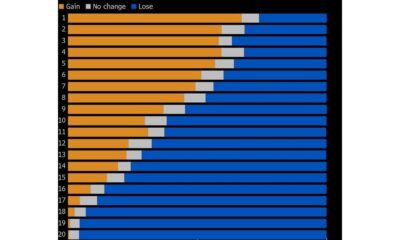Science
UK Physics Departments Face Closure Amid Funding Crisis

A recent survey indicates that a significant portion of UK university physics departments are at risk of closure due to mounting financial pressures. According to the Institute of Physics (IoP), approximately 26% of department heads reported that their institutions could face shut down within the next two years. Additionally, 60% of respondents expect a reduction in course offerings, while 80% are implementing staff cuts.
The survey highlights a critical situation facing the future of physics education in the UK. A head of physics from one university expressed deep concerns regarding their institution’s financial status, noting a £30 million deficit. “Staff recruitment is frozen, morale is low. Yet colleagues in our school continue to deliver with less and less and under increasing pressure,” the department head stated.
Implications for Future Physics Education
Prof Daniel Thomas, chair of the IoP’s heads of physics forum and head of the University of Portsmouth’s School of Physics and Mathematics, emphasized that the findings pose a significant risk to the UK’s leadership in various technological fields. “Physics really underpins all technological advances – it has done so in the past and will do so in the future,” he said.
Key areas such as quantum technology, photonics, space exploration, and green technologies heavily rely on the expertise of skilled physicists. Losing these educational resources threatens the UK’s competitive edge in global markets. Thomas warned, “If we lose those skills, if we don’t educate the next generation in those skills, then of course we are definitely jeopardising our world leadership as a country.”
To address this crisis, the IoP is urging the UK government to take immediate action, including increased funding for existing laboratories and research facilities. They propose the establishment of an “early warning system” to identify departments at risk of closure and measures to alleviate pressures on international student recruitment.
Long-Term Solutions Needed
In addition to immediate support, the IoP is advocating for comprehensive reforms in higher education funding. These changes would enable universities to cover the full costs associated with teaching essential subjects like physics.
Sir Keith Burnett, president of the IoP and former chair of physics at Oxford University, pointed out the necessity of sounding the alarm regarding the national capability essential for the UK’s wellbeing and competitiveness. He stated, “We are walking towards a cliff edge but there is still time to avert a crisis which would lead not just to lost potential but to many physics departments shutting down altogether.”
Prof Thomas highlighted that the erosion of domestic tuition fees and a declining number of international students are contributing factors to the financial challenges faced by smaller physics departments. He warned that this trend could lead to a concentration of physics education in fewer institutions, which may hinder access for disadvantaged groups.
In response to the concerns raised, a government spokesperson noted that public research and innovation funding is set to increase by more than £22.5 billion annually by 2029-30. This increase represents a 3% real-terms rise compared to 2025-26. The spokesperson stated, “Our £86 billion for public research and development until 2030 will help the UK’s world-class universities continue to lead discoveries.”
The situation for physics departments across the UK remains precarious, with urgent action needed to secure the future of physics education and research.
-

 Politics4 weeks ago
Politics4 weeks agoSecwepemc First Nation Seeks Aboriginal Title Over Kamloops Area
-

 World5 months ago
World5 months agoScientists Unearth Ancient Antarctic Ice to Unlock Climate Secrets
-

 Entertainment5 months ago
Entertainment5 months agoTrump and McCormick to Announce $70 Billion Energy Investments
-

 Science5 months ago
Science5 months agoFour Astronauts Return to Earth After International Space Station Mission
-

 Lifestyle5 months ago
Lifestyle5 months agoTransLink Launches Food Truck Program to Boost Revenue in Vancouver
-

 Technology3 months ago
Technology3 months agoApple Notes Enhances Functionality with Markdown Support in macOS 26
-

 Lifestyle3 months ago
Lifestyle3 months agoManitoba’s Burger Champion Shines Again Amid Dining Innovations
-

 Top Stories2 months ago
Top Stories2 months agoUrgent Update: Fatal Crash on Highway 99 Claims Life of Pitt Meadows Man
-

 Politics4 months ago
Politics4 months agoUkrainian Tennis Star Elina Svitolina Faces Death Threats Online
-

 Sports5 months ago
Sports5 months agoSearch Underway for Missing Hunter Amid Hokkaido Bear Emergency
-

 Politics5 months ago
Politics5 months agoCarney Engages First Nations Leaders at Development Law Summit
-

 Technology5 months ago
Technology5 months agoFrosthaven Launches Early Access on July 31, 2025





















